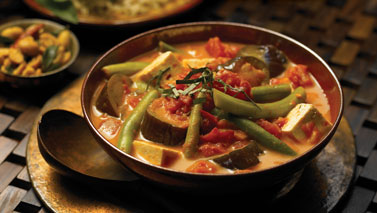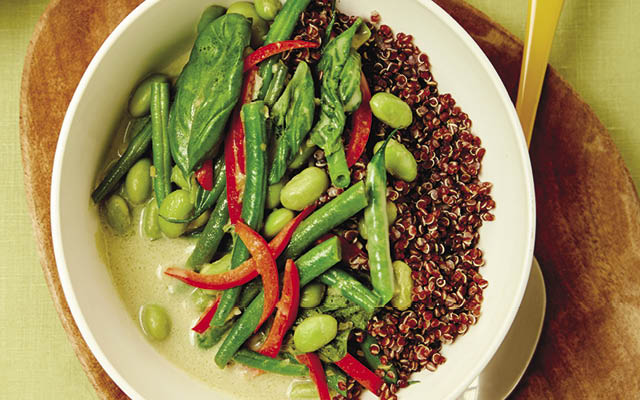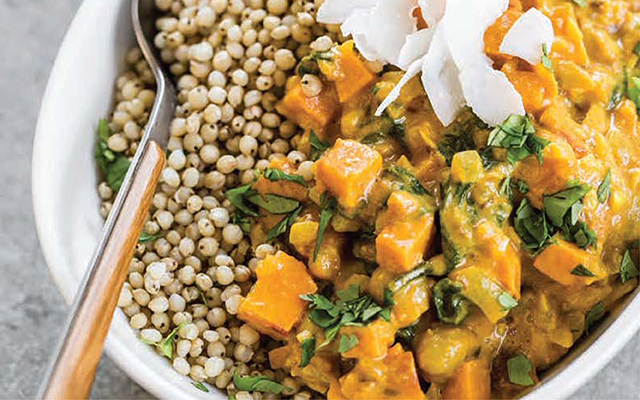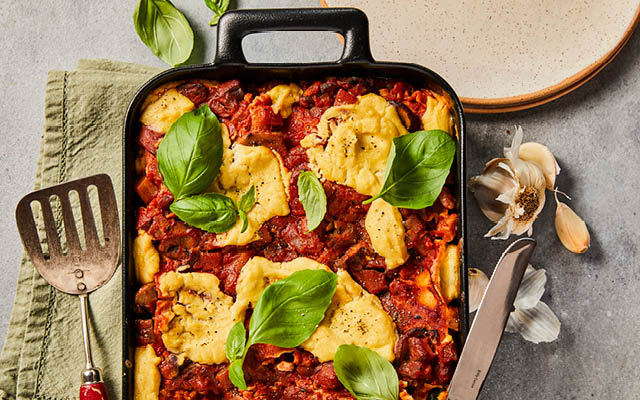Have you heard about the chocolate pudding diet? You know, the one where you eat as much chocolate pudding as you like, with your hands tied behind your back and your face in a trough? It’s fantastic – my brother lost 40 pounds! OK, yes, of course, I’m kidding. But still, don’t you think fad diets have become the unfunny joke of our age?
People just don’t seem to want to admit that the science on losing weight has been decided: If you expend more calories than you consume, you will lose weight. If you exercise, that is good; if you exercise regularly, that is better. If you eat fundamental whole foods, especially plant-based ones, that is good; if you eat them to the point that you eat fewer highly processed foods, that is wonderful indeed.
Oh, and one more thing: If you have been so distracted by all the chocolate pudding diets that you haven’t realized that the basic science is in, look to Eat, Drink and Weigh Less: A Flexible and Delicious Way to Shrink Your Waist Without Going Hungry, the new book by Walter Willett, MD, and Mollie Katzen. Willett is a professor of epidemiology and nutrition at the Harvard School of Public Health and a professor of medicine at Harvard Medical School, and he has spent his career researching the connections between the foods we eat and the bodies we end up with. His previous book, Eat, Drink and Be Healthy, summarized his lifetime of findings, but didn’t translate them into real-life recipes. To remedy this, he teamed up with Mollie Katzen, the well-loved cookbook author of classics such as the Moosewood Cookbook .
Their new book is divided into two halves: The first sums up Willett’s conclusions about diet and nutrition, and the second provides the recipes to help you make simple, sustainable and scientifically supported changes to your eating habits.
I called Mollie Katzen to talk about their book and to find out whether there is any room in the American consciousness for sensible – instead of silly – diets. “People fail to realize that any time you restrict your eating, you’ll lose weight for the first three weeks. You could invent a Häagen Dazs diet, and you’d probably lose weight – at first,” Katzen told me. “The point of this book is that this is a way of eating to move into, and stay with, forever. It’s not about restricting yourself, about deprivation or about taking away – we want to emphasize an abundance mentality. You’re adding more food to your diet. Adding, not taking away.”
Adding food? How is that possible? If you look at the science helpfully provided in this book, you’ll see that adding vegetables to your diet is far more important and far more productive of long-term health benefits than, say, substituting “diet” cookies for the ordinary kind. Eat, Drink and Weigh Less also works with the real-life constrictions of real lives, providing suggestions on how to eat more healthily when you’re on the road and basic recipes that will work with whatever looks good at your local market.
Thai-Inspired Red Curry (recipe below), for instance, can be made with salmon, tofu, chicken or whatever catches your eye. Katzen says the biggest criticism of their book has been that the recipes are not, of all things, difficult enough. Lots of them, like Sparkling Sweet Potatoes (roasted and jazzed up with fresh lime juice) or Apple-Glazed Acorn Squash Rings (just-baked squash rings finished with a gloss of apple juice), can be made by anyone with nothing more than a stove and an interest in eating better.
“There’s this strange dichotomy in our culture where people perceive two sorts of food: food you enjoy that makes you blow up like a blimp; or food that’s healthy, but all beige, unseasoned and a downer,” Katzen says. “With this book, we wanted to say: Healthy eating doesn’t have to be depressing, obligatory or a drag – it can be really delicious and fun.”
The message here isn’t trendy or faddish, notes Katzen, and it isn’t about self-denial either. “Our basic message is ‘Here’s the science, and now let’s make a little more room in your life for things like sweet potatoes,'” says Katzen. “If you eat a few more delicious vegetables, you’ll have a little less room and desire for junk foods, and slowly, incrementally, you’ll have a better diet. We don’t want to present an either-or situation, just an incremental adding of good things.”
Will such a sensible plan ever get the attention of the American public? It’s hard to say, but it’s nice to know that, in this fraught season of New Year’s resolutions and miracle weight-loss schemes, there is an alternative to the next chocolate pudding diet of the day.
Thai-Inspired Red Curry
This makes a great sauce for any protein-of-choice (tofu, chicken breast, cooked fish, beef, tempeh, etc.). You can eat it on its own as you would a soup – or with a little brown basmati rice.
Makes three servings
Ingredients
- 1 cup light coconut milk
- 1/2 cup vegetable broth or chicken stock
- 1 tsp. red curry paste
- 1 tsp. minced fresh ginger
- 2 tbs. fish sauce (optional)
- 2 tsp. brown sugar (optional)
- 1 cup canned diced tomatoes, drained
- 1 cup (about 3 ounces) Japanese or Chinese eggplant, cut into 1/2-inch-thick half-rounds
- 1 cup (about 4 ounces) green beans, cut into 2-inch lengths
- 2 tbs. minced fresh basil (Thai basil, if available)
Directions
- In a medium saucepan, whisk together the coconut milk, broth or stock, red curry paste, and ginger. Bring to a boil over high heat, reduce the heat and simmer, covered, for 15 minutes.
- Stir in the fish sauce and brown sugar, if applicable. Add the diced tomatoes and eggplant. Bring to a boil, then reduce the heat and simmer, uncovered, until the eggplant is tender. Add the green beans and simmer until tender. Serve hot, topped with minced fresh basil.
Thai-Inspired Red Curry will keep for only about a day or two and is best eaten fresh. If you need to store it, refrigerate it in a tightly covered container and reheat it gently.
Recipe excerpted from Eat, Drink and Weigh Less: A Flexible and Delicious Way to Shrink Your Waist Without Going Hungry by Mollie Katzen and Walter Willett, MD (Hyperion, 2006).




This Post Has 0 Comments